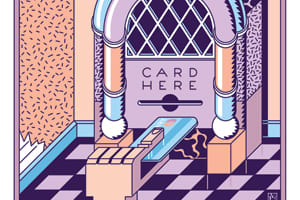Beginning in 2013, Berlin’s club scene will be subject to new fees implemented by GEMA—Germany’s largest music royalties association and a powerful non-governmental organization. A network that represents the copyrights of professional musicians, GEMA plans to change how it charges nightclubs, moving from a standard flat rate for clubs playing GEMA-registered musicians into a more complex per-song fee that could potentially raise charges for some venues by 1400 percent. Advocates of the change say that club owners have to make up for years of low rates, but anti-GEMA activists are arguing that it will force many of the world-famous clubs in Berlin, some of which are open continuously for three or more days, to accrue especially high costs and subsequently be forced to close. We spoke with Michail Stangl, a well-known independent Berlin club promoter responsible for the Leisure System party at the legendary club Berghain, who passionately opposes the new fees. After numerous emails and phone calls requesting an interview, GEMA declined to speak. Here, Stangl presents his side of the debate.
How powerful an organization is GEMA in Germany? Very. GEMA collects money from radio stations, pressing plants and whoever distributes. They collect the money, take away a 15 percent fee and then pay out 85 percent of the money they take in to the musicians. They are even responsible for getting money from the sale of blank CDs and USBs because you can play music with them. A lot of people don’t discuss the GEMA issue because it is highly complicated, and a lot of musicians don’t know how their money is getting from GEMA to them. It’s really hard to figure out: it is not a government agency, it’s not a state agency, it’s not run by the music industry.
What’s the problem with GEMA’s new fee structure, in your opinion? They don’t understand how music is played in 2012. Instead of a yearly fee, they want to charge for each night separately, and their idea
is that if you play even one GEMA-registered artist at a club on any given night, even if you play music off of a burned CD, they will charge you for the entire night. That’s not how DJs work—they come in and out of songs. And then if you stay open longer than five hours, which every club in Berlin does, they’ll charge you 50 percent more.
Why are they raising the fees now? I think since record sales significantly dropped, the online sale of music hasn’t picked up yet, but the live sector of music has picked up in the last year.
Do you think clubs like Berghain will have to close? I can’t say. But I can say that it will affect everyone. If they don’t close, the clubs will have to pass the fees down to the promoters, and the cover charges at the door will have to go up. The nice thing about Berghain is you pay 12 euros and you get an entire weekend of music, basically a mini festival. And drinks are like three euros. But that won’t be possible anymore. I represent the part of the electronic music scene that has an even greater problem, because I work with less profitable musicians. It’s really going to affect the underground most of all.
Do you know anyone that supports the initiative? No. I am not saying that the entire concept of GEMA is wrong. The problem is with the way that [the fee] is structured. You can only become a voting member of GEMA if you earn a certain amount of money through music. There’s only about 3,000 of them and only they decided on this [policy]. And guess who gets 65 percent of the new money that GEMA is taking in? The voting members. So this money is going to people who already make money off of music, and not to the underground, not to the majority of musicians. That’s the fucked up part.
What happens next? Because of protests this year, [the new fees are] now being debated by GEMA through an arbitral court within its organization. But it’s happening behind closed doors. A lot of people are preparing actual lawsuits, because they say this decision and this tariff threatens their existence. To be honest, even though the petition against it has been one of the most effective in Germany in recent years, I am still a bit concerned by how few people realize the threat and cultural loss. It’s so complicated that people give up even talking about it. But even a neighborhood bar where locals are hanging out will have problems: if they play music, they have to pay. We’re not bemoaning just a couple of people that don’t have a valid business model. This is everyone.
